Teaching Plan for PhD Candidates201109
Unit3_teaching_plan
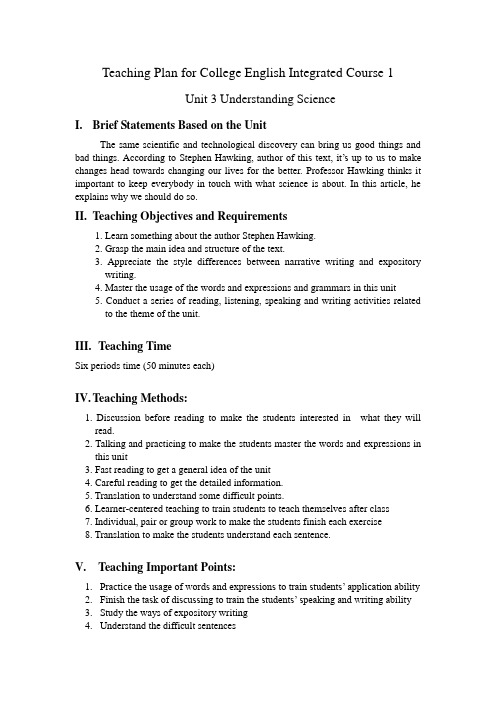
Teaching Plan for College English Integrated Course 1Unit 3 Understanding ScienceI.Brief Statements Based on the UnitThe same scientific and technological discovery can bring us good things and bad things. According to Stephen Hawking, author of thi s text, it’s up to us to make changes head towards changing our lives for the better. Professor Hawking thinks it important to keep everybody in touch with what science is about. In this article, he explains why we should do so.II.Teaching Objectives and Requirements1. Learn something about the author Stephen Hawking.2. Grasp the main idea and structure of the text.3. Appreciate the style differences between narrative writing and expositorywriting.4. Master the usage of the words and expressions and grammars in this unit5. Conduct a series of reading, listening, speaking and writing activities relatedto the theme of the unit.III.T eaching TimeSix periods time (50 minutes each)IV.Teaching Methods:1. Discussion before reading to make the students interested in what they willread.2. Talking and practicing to make the students master the words and expressions inthis unit3. Fast reading to get a general idea of the unit4. Careful reading to get the detailed information.5. Translation to understand some difficult points.6. Learner-centered teaching to train students to teach themselves after class7. Individual, pair or group work to make the students finish each exercise8. Translation to make the students understand each sentence.V.T eaching Important Points:1.Practice the usage of words and expressions to train students’ application ability2.Finish the task of discussing to train the students’ speaking and writing ability3.Study the ways of expository writing4.Understand the difficult sentences5.Grasp the main idea and structure of the unitVI.Teaching Difficult Points:1.How to help the students master the words and expressions.2.How to help the students understand the structure of the text.3.How to help the students finish the task of expository writing.VII.Teaching Procedures:Step 1 Pre-reading tasks (for first two periods)1.Warm-up questions(1). Discussion: What makes Hawking’s achievement so remarkable?(2). Brainstorm: some scientific and technological discoveries that have greatlychanged our lives.(3) Discussion: In what ways do these discoveries change our lives for the better?Or for the worse?(4) Teacher’s conclusion: we should make them head towards changing our livesfor the better. But How?2. Reading for the gist: what does the author want to tell us in the text?3. Structure analysis: Divide the text into three parts and find out the main idea to each of them.Step 2 While-reading activities ( for second two periods)1. Ask questions to check their understanding of the text.(1). Part I of the text (Para 1-3). Question to ask the student:a.What do you think of science?b.What’s the public attitude toward science?(2). Part II of the text (para 4-6). Question to ask the students:a.What can be done to harness this interest?b.What can mass media do?(3). Part III of the text (para 7). Question to ask the students:What’s the Hawking’s hope?(4). Appreciate the style differences between narrative and exposingnguage study: the underlined words or phrases are key ones. Students may berequired to translate some sentences from English into Chinese, or vice versa, or to make sentences of their own. Others are explained briefly in the context.(1). likelya. probable (It is likely that …, be likely to do sth.)e.g. It is likely that my roommate will win the first-class scholarship.Economists say that the quick economic growth is likely to continue throughout the 2010s.b. probably (often used after “most”, “more than”, or“very”)e.g. We will most likely stay home during the National Day.(2). cut off: stop providing sth.e.g. Water and electricity supplies in the city have been cut off because of theAmerican air attacks.Their phone has been cut off because they haven’t paid the bill.(3). ensure: make sure (followed by n. / that-clause)e.g. This new treaty will ensure peace.Come early to ensure that you get a seat.(4). inform: tell (inform sb. of/about sth., inform sb. that clause. It is a fairlyformal word. In conversation you usually use tell.)e.g. They informed us of their arrival at Pudong Airport.Have you informed the police that there's been an accident?informed: having or showing knowledgee.g. Science is now enabling us to make more informed choices abo uthow we use common drugs.(5). in two minds (about sth): unable to decide whether or not you want sth. orwant to do sth.e.g. I think she is in two minds about whether to accept his present or not.(6). basis: basis: (pl. bases)a) the facts or ideas from which sth. can be developed; foundation (usu.used as a singular noun, followed by for or of)e.g. The video will provide a basis for class discussion.The research will form the basis of a book.b) the circumstance that provides a reason for some action or opinion (usu.followed by of or that-clause)e.g. Y ou must stay at home, on the basis of the medical reports we havereceived.Students are able, on the basis of experience, to choose which subjects to specialize in.On the basis that recognizing the problem is halfway to a solution, we should pay much attention to his comments.(7). in terms of: as regards (sth.); expressed as (sth.)e.g. In terms of salary, the job is terrible:In terms of customer satisfaction, the policy can't be criticized.The figures are expressed in terms of a percentage.(8). tend: be likely to happen or have a particular characteristic or effecte.g. Some people tend to get up later at weekends.The old couple tend to buy cheap processed foods like canned chicken.The school bus tends to be early on Monday mornings.(9). in the form of:a) having the shape ofe.g. The lane was in the form of a big "S".The trees were laid out in the form of the figure eight.b) existing in a particular forme.g. They received a benefit in the form of a tax reduction.(10). convey: make (ideas, feelings, etc.) known to anothere.g. Their bright eyes and smiling faces conveyed the impression that theywere very excited.e.g. Words cannot convey how delighted I am that you'll come and spend theweekend with us.(11). proportion: a) a part of a group or an amount (usu. singular)e.g. A large proportion of the city's population is aged over 50.b) the relationship between the amounts, numbers, or sizes ofdifferent things that go together to form a whole (usu. singular)e.g. The proportion of men to women in the medical profession has changed inrecent years.e.g. A large proportion of the dolphins in that area will eventually die becauseof the water pollution.(12). fit into: be part of a situation, system, or plane.g. The new college courses fit into a national education plan.College English videos are designed to fit into the syllabus(13). entertain: a) give pleasure toe.g. Children's television programs not only entertain but also teach.He entertained his friends with stories from his childhood.b) have as a gueste.g. According to the school regulations, women students are not allowed toentertain men in their rooms.My husband is in the kitchen; we are entertaining the Smiths this evening.3. Words study; move the new words and expressions, make sure that the students can read them correctly and learn some of them by heart.Step 3 Post-reading activities (for the third two periods)1. Discussion question:(1). In what may have science and technology changed the world we live in?Give examples.(2). What is your attitude towards science?2. Do and check exercises(1). V ocabulary(2). Word formation(3). Structure(4) Comprehensive exercises3. Essay writing(1) Study “writing strategies”(2) Assign a writing task for the students to finish in two weeksIV. Homework(1). Review the whole text and get familiar with it.(2). Review the structure that have been learned and vocabulary(3) Finish writing the essay(4) Preview the new lesson.VIII.Lesson SummaryThis unit is divided into six periods. Use the student-centered teaching approach. By asking the students to make sentences with the words and expressions in this unit, the students’ ability of using languages is greatly improved. By discussing the topic, not only has the students’ ability of listening, speaking and wri ting been improved, but also enlarge vocabulary. By summing up the main idea of each Part and each Para, the students’ ability of understanding and summing up has been improved. By scanning and previewing and doing exercises by themselves of this unit, the students’ ability of autonomic learning is trained gradually. At last, the students’ ability of comprehensive usage has been improved.College English Listening and Speaking Course(Unit 5. Memory Unit 6. W ealth)Ⅰ. Brief Statements Based on the UnitDo you have a good memory? Memory is critical to humans. Almost all of our daily activities--- talking, reading, working socializing—depend on our having learned and stored information about our environments. Unit 5 Memory will tell you more about how our memory works It will be taught in one period. Part A will deal with speaking (the Questions for Discussion.) . Part B, and Part C give students listening practice. After doing this, the students’ ability to listen and to speak will be improved. Then we will go on with Unit 6 Wealth. The topic of this unit is “Wealth”. Y ou know, wealth is associated with affluence, prosperity , comfort, respect and admiration. But people should have a good attitude towards wealth. This unit will be arranged in one period. The first step arranges discussion about wealth. After that, do some listening practice about the topic of wealth. After doing this, the students’ ability to listen and to speak will be improved.Ⅱ.T eaching Objectives and Requirements1.Training the ability of listening and speaking2.Understand the topic and master the skill of listening3.Students can analyze and sum up the material of listening4.Master some new word and expressions5.After listening, do a lot of speakingⅢ.T eaching Time: College English Listening and Speaking Course Two periodsⅣ.T eaching Methods: Communicative / Functional/ Notional ApproachⅤ.T eaching Important Points:1.Train the students’ listening ability by listening practice2.Train the students’ speak ing ability by talking about memory and wealthⅥ.T eaching Difficult Points:1.How to improve the students’ listening ability.2.How to help the students finish the task of speaking.Ⅶ. T eaching Procedures:Unit 5. MemoryStep 1. Questions for discussion1.What is memory? How does it work?2.What is your earliest memory?3.How good is your memory? Are you good at remembering something?4.How important is a good memory in learning English?5.How can we improve our memory?Step 2. Listen to Part B1.Retell some important sentences2.Retell the main idea3.Exercise 1 and Exercise 2Step 3. Listen to Part C and do exercise of Part CStep 4. SummaryMemory can be defined as the capacity to keep information available for later use. Some people have a good memory. Of course memory is very important. Without memory, life would become a series of disconnected experiences. Memory can be divided into three types of memory: sensory memory, short-term memory and long-term memory. A short-term memory is temporary, as it is stored for a very short time in the brain. To learn a foreign language well, a good memory is an advantage. A good memory is built up by frequent use. Also we must allow the brain to have enough sleep and rest.Step 5. Homework (Listen to Part D)Unit 6. WealthStep 1. Questions for discussion1.What is your attitude to Wealth?2.Do you think money can bring you happiness? Why?3.What are some of the valuable things in life that money cannot buy?Step 2. Listen to Part B4.Retell some important sentences5.Retell the main idea6.Exercise 1 and Exercise 2Step 3. Listen to Part C and do exercise of Part CStep 4. SummaryWealth is essential for one’s life. It can be supposed to be able to satisfy the personal wishes. It is man’s greatest source of joy and an excel lent servant. But sometime wealth can trap people into various obligations and money doesn’t ensure happiness. Money bring you food, but not appetite. Money can bring medicine but not health. Happiness does not depend on the amount of money you have. A happy man is one who is content whether he is rich or poor. So we must have a right attitude to the wealth.Step 5. Homework (Listen to Part D)。
博士阶段的打算英文作文
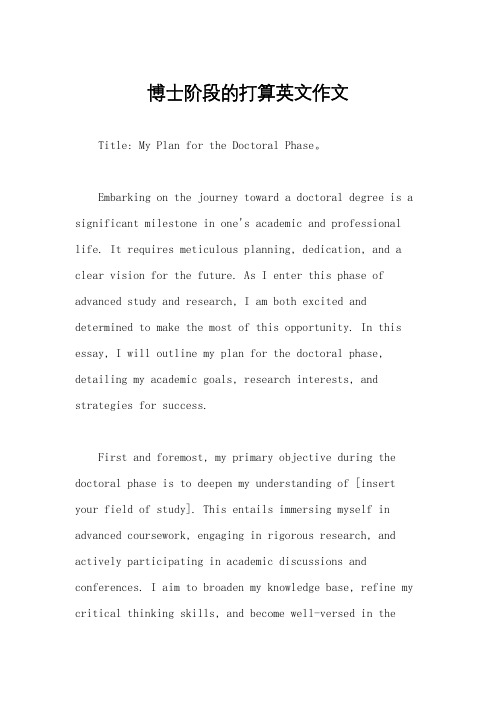
博士阶段的打算英文作文Title: My Plan for the Doctoral Phase。
Embarking on the journey toward a doctoral degree is a significant milestone in one's academic and professional life. It requires meticulous planning, dedication, and a clear vision for the future. As I enter this phase of advanced study and research, I am both excited and determined to make the most of this opportunity. In this essay, I will outline my plan for the doctoral phase, detailing my academic goals, research interests, and strategies for success.First and foremost, my primary objective during the doctoral phase is to deepen my understanding of [insert your field of study]. This entails immersing myself in advanced coursework, engaging in rigorous research, and actively participating in academic discussions and conferences. I aim to broaden my knowledge base, refine my critical thinking skills, and become well-versed in thelatest developments and debates within my field.In addition to academic pursuits, I intend to actively contribute to the scholarly community through publications, presentations, and collaborations. Publishing research findings in peer-reviewed journals and presenting at conferences not only enhances one's academic reputation but also fosters intellectual exchange and advances the collective knowledge of the discipline. I am committed to producing high-quality research that contributes meaningfully to the advancement of [insert your field of study].Furthermore, I recognize the importance of mentorship and collaboration in academic success. I plan to seek guidance from experienced faculty members and build collaborative relationships with fellow doctoral students and researchers. By leveraging the expertise and support of others, I believe I can overcome challenges moreeffectively and achieve greater scholarly impact.Moreover, I am keenly aware of the significance ofinterdisciplinary perspectives in addressing complex research questions and solving real-world problems. Therefore, I intend to explore interdisciplinary collaborations and incorporate insights from related fields into my research. By adopting a multidisciplinary approach, I hope to generate innovative solutions and broaden the scope of my scholarly inquiries.Another critical aspect of the doctoral phase is professional development and career preparation. Inaddition to honing my research skills, I plan to acquire teaching experience, develop grant-writing abilities, and cultivate leadership qualities. These transferable skills will not only enhance my academic credentials but also prepare me for diverse career opportunities in academia, industry, government, or the nonprofit sector.Furthermore, I am committed to maintaining a healthy work-life balance during the doctoral phase. While academic pursuits are undoubtedly demanding, I recognize the importance of self-care, leisure activities, and personal relationships in sustaining long-term well-being andproductivity. I plan to prioritize self-care practices, set realistic goals, and allocate time for relaxation and recreation.In conclusion, the doctoral phase represents a pivotal stage in my academic and professional journey. By pursuing advanced study and research with passion, perseverance, and purpose, I aim to make meaningful contributions to thefield of [insert your field of study], advance knowledge and innovation, and prepare myself for a fulfilling and impactful career. With dedication, diligence, and a commitment to lifelong learning, I am confident that I will thrive in the doctoral phase and beyond.。
博士学习计划英文
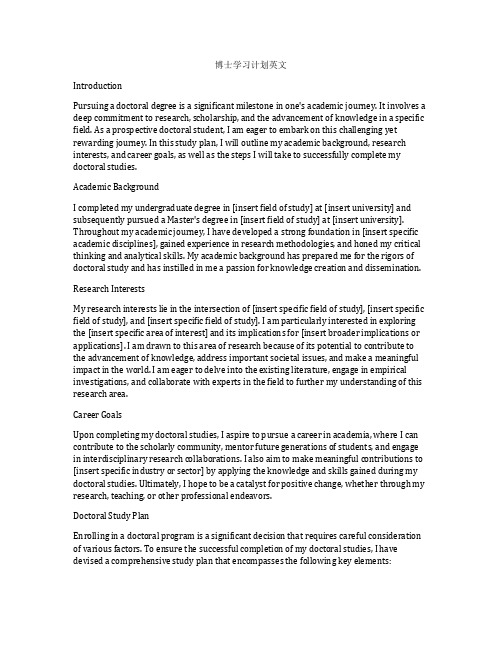
博士学习计划英文IntroductionPursuing a doctoral degree is a significant milestone in one's academic journey. It involves a deep commitment to research, scholarship, and the advancement of knowledge in a specific field. As a prospective doctoral student, I am eager to embark on this challenging yet rewarding journey. In this study plan, I will outline my academic background, research interests, and career goals, as well as the steps I will take to successfully complete my doctoral studies.Academic BackgroundI completed my undergraduate degree in [insert field of study] at [insert university] and subsequently pursued a Master's degree in [insert field of study] at [insert university]. Throughout my academic journey, I have developed a strong foundation in [insert specific academic disciplines], gained experience in research methodologies, and honed my critical thinking and analytical skills. My academic background has prepared me for the rigors of doctoral study and has instilled in me a passion for knowledge creation and dissemination.Research InterestsMy research interests lie in the intersection of [insert specific field of study], [insert specific field of study], and [insert specific field of study]. I am particularly interested in exploring the [insert specific area of interest] and its implications for [insert broader implications or applications]. I am drawn to this area of research because of its potential to contribute to the advancement of knowledge, address important societal issues, and make a meaningful impact in the world. I am eager to delve into the existing literature, engage in empirical investigations, and collaborate with experts in the field to further my understanding of this research area.Career GoalsUpon completing my doctoral studies, I aspire to pursue a career in academia, where I can contribute to the scholarly community, mentor future generations of students, and engage in interdisciplinary research collaborations. I also aim to make meaningful contributions to [insert specific industry or sector] by applying the knowledge and skills gained during my doctoral studies. Ultimately, I hope to be a catalyst for positive change, whether through my research, teaching, or other professional endeavors.Doctoral Study PlanEnrolling in a doctoral program is a significant decision that requires careful consideration of various factors. To ensure the successful completion of my doctoral studies, I have devised a comprehensive study plan that encompasses the following key elements:1. Selecting a doctoral program: I will carefully research and evaluate doctoral programs that align with my research interests and career goals. Factors such as faculty expertise, research opportunities, and funding options will inform my choice of program.2. Developing a research proposal: With the guidance of my academic advisors and mentors,I will develop a research proposal that outlines the scope, objectives, and methodology of my doctoral research. This process will involve conducting a thorough literature review, refining my research questions, and identifying the theoretical frameworks that will underpin my work.3. Establishing a support network: I will seek out mentors, collaborators, and fellow students who can provide guidance, feedback, and support throughout my doctoral studies. Building a strong support network will be crucial for navigating the challenges of doctoral research and maintaining a sense of community and belonging.4. Engaging in coursework and seminars: I will take advantage of the coursework and seminar offerings within my doctoral program to deepen my understanding of relevant theoretical and methodological approaches. I will also seek out interdisciplinary courses and workshops that complement my research interests and broaden my intellectual horizons.5. Conducting empirical research: I will engage in rigorous empirical research, which may involve conducting fieldwork, experiments, interviews, or archival work. I will work closely with my academic advisors and research collaborators to ensure the quality and rigor of my research methods and findings.6. Publishing and presenting findings: I will actively seek opportunities to disseminate my research findings through academic publications, conference presentations, and public engagement activities. I will also seek out feedback and critique from peers and experts in my field to continuously refine my work.7. Balancing research and professional development: I will prioritize self-care, work-life balance, and skill development throughout my doctoral studies. I will seek out professional development opportunities, such as teaching or research assistantships, grant writing workshops, and leadership training, to enhance my academic and professional skills.ConclusionEmbarking on a doctoral journey is a transformative and intellectually enriching experience. With a well-thought-out study plan, a strong support network, and a commitment to scholarly inquiry, I am confident that I will successfully complete my doctoral studies and make meaningful contributions to my field of study. I am excited to embrace the challenges and opportunities that lie ahead and look forward to the personal and professional growth that my doctoral journey will bring.。
我的博士计划英语作文
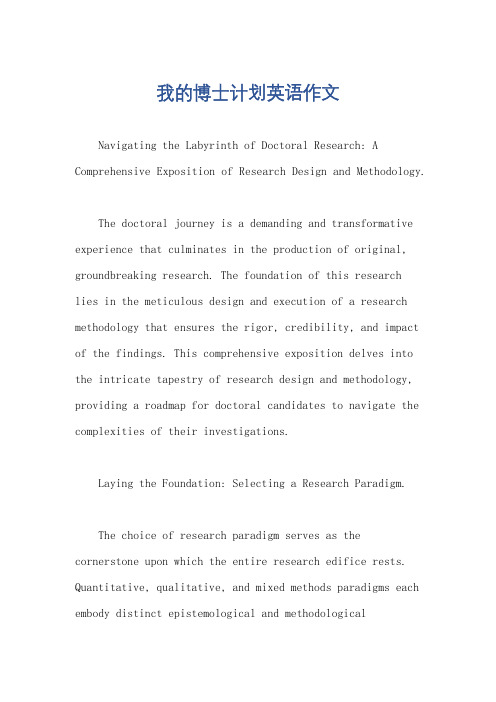
我的博士计划英语作文Navigating the Labyrinth of Doctoral Research: A Comprehensive Exposition of Research Design and Methodology.The doctoral journey is a demanding and transformative experience that culminates in the production of original, groundbreaking research. The foundation of this researchlies in the meticulous design and execution of a research methodology that ensures the rigor, credibility, and impact of the findings. This comprehensive exposition delves into the intricate tapestry of research design and methodology, providing a roadmap for doctoral candidates to navigate the complexities of their investigations.Laying the Foundation: Selecting a Research Paradigm.The choice of research paradigm serves as the cornerstone upon which the entire research edifice rests. Quantitative, qualitative, and mixed methods paradigms each embody distinct epistemological and methodologicalapproaches, influencing data collection strategies, analysis techniques, and the nature of the knowledge produced.Quantitative research, rooted in positivist philosophy, emphasizes objective, numerical data, statistical analysis, and the testing of hypotheses. It seeks to establish cause-and-effect relationships and generalize findings to wider populations. Qualitative research, on the other hand, embraces interpretivist and constructivist perspectives, emphasizing in-depth understanding, contextual analysis, and the exploration of subjective experiences. Mixed methods research combines elements of both quantitative and qualitative paradigms, aiming to triangulate findings and enhance the comprehensiveness of the research.Designing the Research Question: The Heart of the Inquiry.The research question forms the nucleus of the research project, guiding the entire investigation. It should be specific, focused, and feasible within the constraints ofthe researcher's resources and expertise. Effectiveresearch questions are concise, clear, and avoid ambiguity, ensuring that the research remains on track and delivers meaningful insights.Sampling: Selecting Representatives from the Population.Sampling involves selecting a subset of the populationto represent the entire group. Probability sampling methods, such as random sampling, ensure that each member of the population has an equal chance of being included in the sample. Non-probability sampling methods, such as purposive sampling, are used when specific characteristics are of interest. The choice of sampling method depends on the research question, the population size, and the resources available.Data Collection: Methods for Gathering Information.Data collection is the process of gathering raw information relevant to the research question. Quantitative data collection methods include surveys, questionnaires,and experiments, while qualitative methods include interviews, focus groups, and observations. Mixed methods research may incorporate a combination of methods to triangulate findings and enhance the reliability of the conclusions.Data Analysis: Uncovering Meaning from Data.Data analysis is the process of transforming raw data into meaningful information. Quantitative data analysis involves statistical techniques, such as descriptive statistics, inferential statistics, and regression analysis. Qualitative data analysis involves inductive and deductive reasoning, thematic analysis, and discourse analysis. Mixed methods research employs both quantitative and qualitative analysis techniques, integrating the findings to provide a more comprehensive understanding of the research topic.Interpretation and Discussion: Drawing Conclusions and Implications.The interpretation and discussion of the findings arecrucial steps in the research process. Researchers synthesize the analyzed data, draw conclusions, and discuss the implications of the findings. They consider the limitations and strengths of the study, explore the meaning of the results, and relate them to existing research and theory. The discussion should be evidence-based, logical, and address the research question comprehensively.Ethical Considerations: Ensuring Integrity and Respect.Ethical considerations are paramount in doctoral research, ensuring the protection of human subjects, the responsible use of data, and the maintenance of academic integrity. Researchers must adhere to ethical guidelines, obtain informed consent, minimize harm to participants, and protect their confidentiality. They must also practice academic honesty, cite sources appropriately, and avoid plagiarism or misrepresentation of data.Dissemination and Impact: Sharing the Research with the World.Disseminating research findings is essential for contributing to the advancement of knowledge and benefiting society. Doctoral candidates present their research at conferences, publish in academic journals, and share their findings through public outreach initiatives. The impact of the research can be measured by its influence on policy, practice, and further research.Conclusion: A Journey of Discovery and Transformation.The doctoral research journey is an arduous but immensely rewarding endeavor that challenges researchers to push the boundaries of knowledge and make meaningful contributions to their field. By carefully considering research design and methodology, doctoral candidates lay the groundwork for rigorous and impactful research. The navigation of this labyrinthine process cultivates critical thinking, problem-solving abilities, and an unwavering commitment to the pursuit of truth and understanding.。
韩国博士英语学习计划
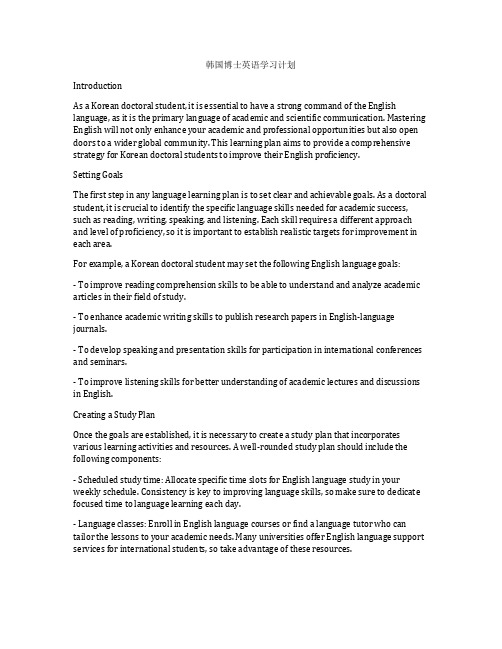
韩国博士英语学习计划IntroductionAs a Korean doctoral student, it is essential to have a strong command of the English language, as it is the primary language of academic and scientific communication. Mastering English will not only enhance your academic and professional opportunities but also open doors to a wider global community. This learning plan aims to provide a comprehensive strategy for Korean doctoral students to improve their English proficiency.Setting GoalsThe first step in any language learning plan is to set clear and achievable goals. As a doctoral student, it is crucial to identify the specific language skills needed for academic success, such as reading, writing, speaking, and listening. Each skill requires a different approach and level of proficiency, so it is important to establish realistic targets for improvement in each area.For example, a Korean doctoral student may set the following English language goals:- To improve reading comprehension skills to be able to understand and analyze academic articles in their field of study.- To enhance academic writing skills to publish research papers in English-language journals.- To develop speaking and presentation skills for participation in international conferences and seminars.- To improve listening skills for better understanding of academic lectures and discussions in English.Creating a Study PlanOnce the goals are established, it is necessary to create a study plan that incorporates various learning activities and resources. A well-rounded study plan should include the following components:- Scheduled study time: Allocate specific time slots for English language study in your weekly schedule. Consistency is key to improving language skills, so make sure to dedicate focused time to language learning each day.- Language classes: Enroll in English language courses or find a language tutor who can tailor the lessons to your academic needs. Many universities offer English language support services for international students, so take advantage of these resources.- Self-study materials: Utilize a variety of self-study materials, such as textbooks, workbooks, language learning apps, and online resources. Choose materials that align with your specific language goals, such as academic English writing guides or English for research purposes.- Language exchange: Engage in language exchange with native English speakers or other international students who are also learning English. Practicing conversation and language skills with others can help improve fluency and conversational skills.- Immersion activities: Immerse yourself in the English language by watching English-language movies, TV shows, and documentaries. This will help improve listening skills and expose you to natural language usage.- Academic writing practice: Take on writing projects in English, such as drafting research papers, articles, or abstracts. Seek feedback from professors or colleagues to improve your writing skills.- Presentation practice: Deliver presentations in English at departmental seminars or student conferences to gain confidence and proficiency in public speaking.Monitoring ProgressRegular assessment of language skills is crucial to monitor progress and identify areas for improvement. There are several ways to track language proficiency, such as:- Language proficiency tests: Take standardized English language tests, such as the TOEFL or IELTS, to gauge your overall language proficiency. These tests provide a benchmark for improvement and can be used to measure progress over time.- Language assessment tools: Use language assessment tools to evaluate specific language skills, such as reading, writing, speaking, and listening. Many online platforms offer diagnostic tests and language skill assessments.- Feedback and evaluation: Seek feedback from language instructors, peers, or language partners on your language skills. Constructive feedback can help pinpoint areas for improvement and guide your language learning efforts.Adapting to Academic DemandsAs a doctoral student, it is important to adapt language learning activities to the demands of your academic program. This may involve incorporating English language study into your research activities, coursework, and academic writing. Here are some ways to align language learning with academic requirements:- Use English-language literature: Incorporate English-language research papers and academic texts into your literature review and research process. This will not only improve your language skills but also deepen your understanding of the academic discourse in your field.- Attend English-language seminars and conferences: Participate in English-language academic events to practice listening and speaking skills in a professional setting. Engage in discussions and network with fellow researchers to further develop language proficiency.- Engage in English-language collaborations: Seek collaboration opportunities with international researchers or join research groups that operate in English. Collaborative projects and discussions will expose you to academic English usage and foster language development.Seeking SupportIt is important to seek support and guidance in your language learning journey. As a doctoral student, you can utilize the following resources for language support:- Language instructors: Seek guidance from experienced language instructors or English language specialists who can provide targeted language support and feedback.- Language centers: Many universities have language support centers that offer tutoring, language resources, and workshops specifically tailored to the needs of international students.- Peer support: Create a support network with other international students or colleagues who are also working to improve their English language skills. Peer support and language exchange can provide motivation and encouragement.ConclusionMastering English as a Korean doctoral student requires a dedicated and tailored approach to language learning. By setting clear goals, creating a comprehensive study plan, monitoring progress, and aligning language learning with academic demands, Korean doctoral students can significantly improve their English language skills. With continuous effort and support, language proficiency will enhance academic success, professional opportunities, and participation in the global scholarly community.。
博士学习计划英文版
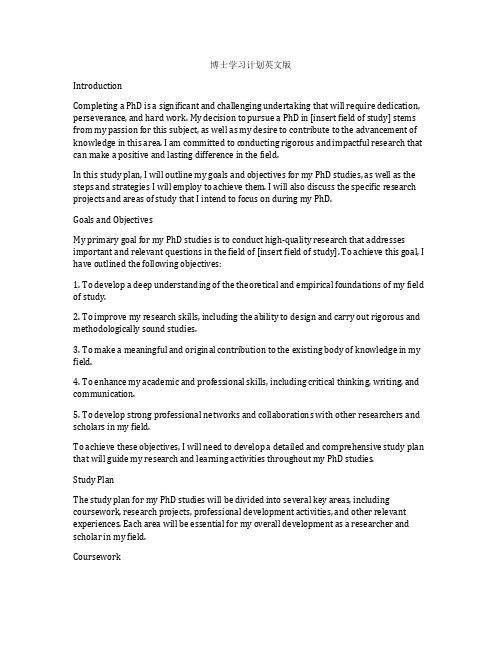
博士学习计划英文版IntroductionCompleting a PhD is a significant and challenging undertaking that will require dedication, perseverance, and hard work. My decision to pursue a PhD in [insert field of study] stems from my passion for this subject, as well as my desire to contribute to the advancement of knowledge in this area. I am committed to conducting rigorous and impactful research that can make a positive and lasting difference in the field.In this study plan, I will outline my goals and objectives for my PhD studies, as well as the steps and strategies I will employ to achieve them. I will also discuss the specific research projects and areas of study that I intend to focus on during my PhD.Goals and ObjectivesMy primary goal for my PhD studies is to conduct high-quality research that addresses important and relevant questions in the field of [insert field of study]. To achieve this goal, I have outlined the following objectives:1. To develop a deep understanding of the theoretical and empirical foundations of my field of study.2. To improve my research skills, including the ability to design and carry out rigorous and methodologically sound studies.3. To make a meaningful and original contribution to the existing body of knowledge in my field.4. To enhance my academic and professional skills, including critical thinking, writing, and communication.5. To develop strong professional networks and collaborations with other researchers and scholars in my field.To achieve these objectives, I will need to develop a detailed and comprehensive study plan that will guide my research and learning activities throughout my PhD studies.Study PlanThe study plan for my PhD studies will be divided into several key areas, including coursework, research projects, professional development activities, and other relevant experiences. Each area will be essential for my overall development as a researcher and scholar in my field.CourseworkAs part of my PhD studies, I plan to take a range of coursework to develop my understanding of the theoretical and empirical foundations of my field of study. This will include courses in [insert specific topics, such as research methods, statistics, and theory in my field], as well as more specialized courses related to my specific research interests. These courses will provide me with the knowledge and skills necessary to conduct high-quality research and make meaningful contributions to the field.In addition to traditional coursework, I plan to engage in independent study and reading to further deepen my understanding of key concepts and debates in my field. I will also seek opportunities to attend workshops, seminars, and conferences to learn from and engage with other researchers and scholars in my field.Research ProjectsConducting rigorous and impactful research will be a central focus of my PhD studies. I plan to undertake several research projects that will contribute to the existing body of knowledge in my field. These projects will address important questions and topics that have practical relevance and theoretical significance.To achieve this, I will work closely with my academic supervisors and mentors to develop and refine my research projects, as well as seek out opportunities for collaboration and support from other researchers and scholars in my field. I will also seek funding and grants to help support my research activities and facilitate the dissemination of my findings.Professional Development ActivitiesIn addition to coursework and research projects, I plan to engage in a range of professional development activities to enhance my academic and professional skills. This will include opportunities for training and development in areas such as academic writing, presentation skills, and grant writing. I will also seek opportunities for teaching and mentoring to further develop my skills and experience in these areas.Finally, I plan to actively seek opportunities for networking and collaboration with other researchers and scholars in my field. This will include attending conferences and workshops, participating in research groups and seminars, and seeking out opportunities for joint research projects and publications.TimelineTo accomplish my goals and objectives for my PhD studies, I have developed a detailed timeline that outlines the specific activities and milestones I plan to achieve during each year of my studies. This timeline will guide my work and ensure that I make steady progress towards completing my PhD. This timeline includes progress on coursework, research projects, professional development activities, and other relevant experiences. I understand that this timeline is subject to change, and I will be flexible and open to adapting my plans as necessary to accommodate unforeseen circumstances or opportunities.ConclusionCompleting a PhD is a significant and challenging undertaking that will require dedication, perseverance, and hard work. Through my detailed study plan, I have outlined my goals and objectives for my PhD studies, as well as the steps and strategies I will employ to achieve them. I am committed to conducting rigorous and impactful research that can make a positive and lasting difference in the field. I am confident that with hard work and dedication, I will achieve my goals and make a meaningful contribution to the field of [insert field of study]. Thank you for considering my PhD study plan.。
Teaching-Plan--Dec.9th-2009
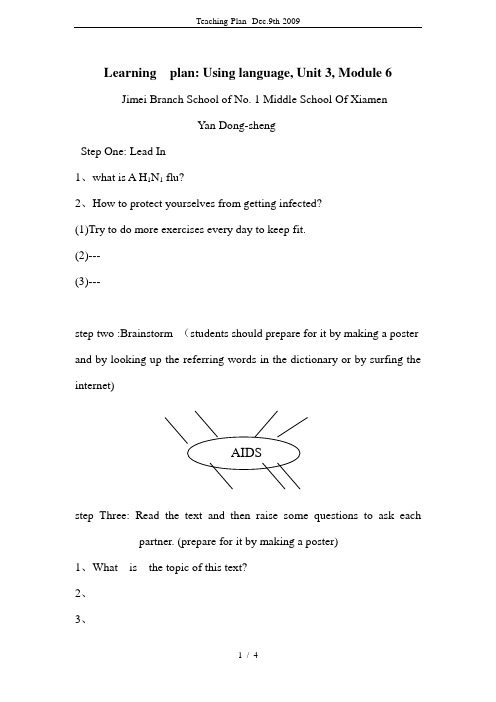
Learning plan: Using language, Unit 3, Module 6 Jimei Branch School of No. 1 Middle School Of XiamenYan Dong-shengStep One: Lead In1、what is A H1N1 flu?2、How to protect yourselves from getting infected?(1)Try to do more exercises every day to keep fit.(2)---(3)---step two :Brainstorm (students should prepare for it by making a poster and by looking up the referring words in the dictionary or by surfing the internet)step Three: Read the text and then raise some questions to ask each partner. (prepare for it by making a poster)1、What is the topic of this text?2、3、Step Four: Detail ReadingAsk students to make up some statements for their partner to judge whether it is true or false, If it is false, try to correct it. (prepare for it by making a poster)1. You can only get HIV from injecting drugs.→You can only get HIV from injecting drugs or have sex with aperson infected HIV.2.3.Step Five: Learn to draw a conclusion (prepare for it by making a poster)What are the ways of protection from getting HIV virus?1.Do not share your needle with anyone else.2.3.4.Step Six: Discussion (on P23 no.3 discussion) (prepare for it by making a poster)*How would you deal with a person with HIV/AIDS in the future?1.Firstly, we can shake hands with them.2.Do not share your needle with anyone else.3.4.5.Step Seven: Using languageRead the poster again, try to find some key words, phrase- s or patterns, then try to illustrate(说明) their usages; try to make up some sentences to use them. (prepare for it by making a poster)1.risk n. 冒险at riskat the risk of doing sth冒险做某事:冒做某事之险Eg. When we use mobile phones, we are at the risk of radiation. Step Four: Conclusion of this period1.The knowledge of HIV/AIDS2.Discussion the attitudes to AIDS patients.3.learn to use some useful language items in the poster.Step Nine: Homework Assignment*write a composition(120 words)“Living With A1DS”1.What is HIV/AIDS?2.How is it spread?3.How to deal with it?4.What is the correct attitude to living with AIDS?*Finish off the exercises on Papers T3.Reaking D&E。
博士英语学习计划
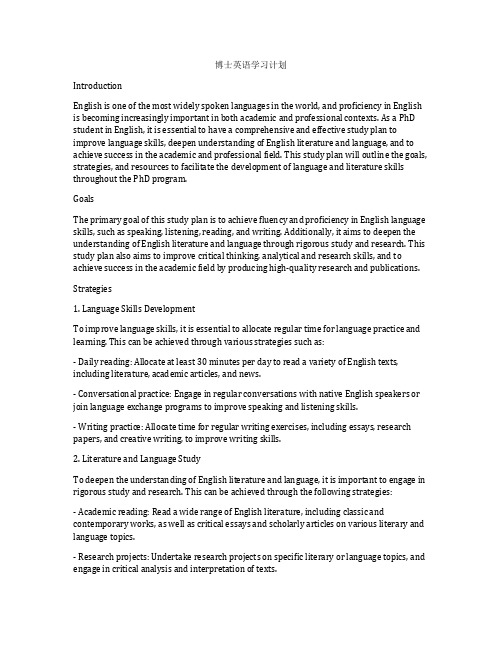
博士英语学习计划IntroductionEnglish is one of the most widely spoken languages in the world, and proficiency in English is becoming increasingly important in both academic and professional contexts. As a PhD student in English, it is essential to have a comprehensive and effective study plan to improve language skills, deepen understanding of English literature and language, and to achieve success in the academic and professional field. This study plan will outline the goals, strategies, and resources to facilitate the development of language and literature skills throughout the PhD program.GoalsThe primary goal of this study plan is to achieve fluency and proficiency in English language skills, such as speaking, listening, reading, and writing. Additionally, it aims to deepen the understanding of English literature and language through rigorous study and research. This study plan also aims to improve critical thinking, analytical and research skills, and to achieve success in the academic field by producing high-quality research and publications.Strategies1. Language Skills DevelopmentTo improve language skills, it is essential to allocate regular time for language practice and learning. This can be achieved through various strategies such as:- Daily reading: Allocate at least 30 minutes per day to read a variety of English texts, including literature, academic articles, and news.- Conversational practice: Engage in regular conversations with native English speakers or join language exchange programs to improve speaking and listening skills.- Writing practice: Allocate time for regular writing exercises, including essays, research papers, and creative writing, to improve writing skills.2. Literature and Language StudyTo deepen the understanding of English literature and language, it is important to engage in rigorous study and research. This can be achieved through the following strategies:- Academic reading: Read a wide range of English literature, including classic and contemporary works, as well as critical essays and scholarly articles on various literary and language topics.- Research projects: Undertake research projects on specific literary or language topics, and engage in critical analysis and interpretation of texts.- Discussion groups: Participate in discussion groups, seminars, and workshops to exchange ideas and perspectives on literary and language topics.3. Critical Thinking and Research SkillsTo improve critical thinking, analytical, and research skills, it is important to engage in various academic activities, including:- Seminars and workshops: Participate in academic seminars and workshops to develop critical thinking and analytical skills through discussions and presentations.- Research projects: Undertake independent research projects to develop research skills, including literature review, data collection, analysis, and interpretation.- Publication and presentation: Aim to produce high-quality research papers and presentations for academic conferences and publications to enhance research skills and knowledge dissemination.Resources1. Academic Courses and WorkshopsTake advantage of academic courses and workshops offered by the university to improve language skills and deepen understanding of English literature and language.2. Language Exchange ProgramsJoin language exchange programs to engage in conversational practice and improve speaking and listening skills with native English speakers.3. Academic Journals and PublicationsRegularly read academic journals and publications related to English literature and language to stay updated on the latest research and scholarship in the field.4. Academic Seminars and ConferencesParticipate in academic seminars and conferences to engage in discussions, exchange ideas, and present research findings to enhance critical thinking and research skills. ConclusionIn conclusion, this study plan aims to facilitate the development of language and literature skills throughout the PhD program, and to achieve fluency and proficiency in English language skills, deepen understanding of English literature and language, and to achieve success in the academic and professional field. By implementing the outlined strategies and utilizing the available resources, it is possible to achieve these goals and excel in the field of English literature and language.。
Teaching+Plan+for+Spoken+English+in+Junior+High+Sc

202X-12-18
• Teaching objectives and requirements
• Teaching content and arrangement
• Teaching methods and means • Teaching evaluation and
02
Teaching content and arrangement
Basic knowledge of oral munication
Phonological knowledge
Students will learn about the basic sounds of English, including voices, consonants, and diphthongs They will also learn about the promotion of different accounts and dialects
content and objectives, such as shopping, traveling, seeking medical treatment, etc. • Student practice: Students can practice speaking in simulated situations, play different roles, engage
• Lesson: The teacher will give a lecture on the basic knowledge of English listening and speaking, grammar and vocabulary, and introduce some learning methods and skills
高校思政课教师攻读博士学位专项计划
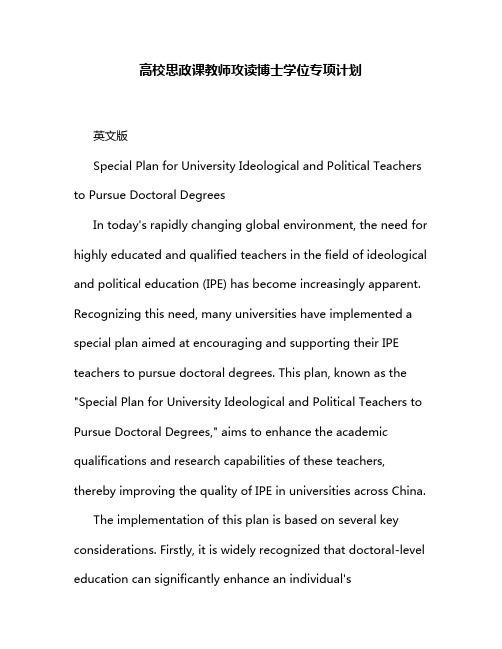
高校思政课教师攻读博士学位专项计划英文版Special Plan for University Ideological and Political Teachers to Pursue Doctoral DegreesIn today's rapidly changing global environment, the need for highly educated and qualified teachers in the field of ideological and political education (IPE) has become increasingly apparent. Recognizing this need, many universities have implemented a special plan aimed at encouraging and supporting their IPE teachers to pursue doctoral degrees. This plan, known as the "Special Plan for University Ideological and Political Teachers to Pursue Doctoral Degrees," aims to enhance the academic qualifications and research capabilities of these teachers, thereby improving the quality of IPE in universities across China.The implementation of this plan is based on several key considerations. Firstly, it is widely recognized that doctoral-level education can significantly enhance an individual'sunderstanding of a subject matter, their ability to conduct independent research, and their capacity to contribute to academic discussions and debates. By providing their IPE teachers with the opportunity to pursue doctoral degrees, universities are investing in their professional development and 成长, ensuring that they are well-prepared to meet the challenges of teaching and research in this important field.Secondly, the special plan recognizes the unique role that IPE teachers play in shaping the ideological and political perspectives of students. These teachers are not only responsible for imparting knowledge but also for guiding students in their moral and ethical development. By enhancing their academic qualifications, universities are ensuring that their IPE teachers are equipped with the necessary tools and skills to effectively fulfill this role.The special plan for university IPE teachers to pursue doctoral degrees typically involves several key components. Firstly, it offers financial support to teachers who wish to pursuedoctoral studies, including grants and scholarships to cover tuition fees and living expenses. This financial support is crucial in enabling teachers to focus on their studies without having to worry about financial burden.Secondly, the plan provides teachers with access to high-quality academic resources and mentorship opportunities. This includes access to libraries, research centers, and other facilities that can support their doctoral studies. Additionally, universities often pair these teachers with experienced mentors who can guide them through the research process, offering valuable advice and support.Lastly, the special plan aims to create a supportive and inclusive learning environment for doctoral students. This includes providing them with opportunities to participate in academic conferences, seminars, and other events that can help them expand their networks and knowledge base. By fostering a community of scholars who are committed to IPE, universitiesare ensuring that their teachers have a strong support system to rely on throughout their doctoral journey.In conclusion, the special plan for university IPE teachers to pursue doctoral degrees is an important initiative that aims to enhance the academic qualifications and research capabilities of these teachers. By providing financial support, access to high-quality academic resources, and a supportive learning environment, universities are investing in the professional development of their IPE teachers and ensuring that they are well-prepared to meet the challenges of teaching and research in this crucial field. As a result, the quality of IPE in universities across China is expected to improve significantly, contributing to the overall development and growth of society.高校思政课教师攻读博士学位专项计划在当今迅速变化的全球环境中,对于思想政治教育领域具备高度教育和专业资质的教师需求日益显现。
博士 研究计划 英文面试

博士研究计划英文面试English:My research plan for the doctoral program focuses on exploring the impact of artificial intelligence (AI) on the future of work and the economy. I am particularly interested in understanding how AI technologies are shaping the labor market, workforce dynamics, and the overall business landscape. My goal is to investigate how AI is transforming traditional job roles, creating new opportunities, and impacting the distribution of wealth and resources. Additionally, I plan to examine the ethical and social implications of AI adoption in various industries, as well as the potential policy frameworks needed to ensure a fair and sustainable transition. Through this research, I aim to contribute valuable insights to the ongoing discourse on AI and its effect on society, and to inform decision-makers and stakeholders on the best practices for harnessing the potential of AI while addressing its challenges.中文翻译:我的博士研究计划旨在探讨人工智能对未来工作和经济的影响。
博士出国留学英文学习计划

博士出国留学英文学习计划Name: [Your Name]Field of Study: [Your Field of Study]University: [Name of the University]IntroductionStudying abroad for a PhD is a significant decision, and it requires careful planning and preparation. Given the level of commitment and dedication that a PhD program demands, it is essential to have a well-thought-out study plan to ensure success and maximize the opportunities that come with studying in a foreign country.In this study plan, I will outline my goals, objectives, and strategies for my PhD study abroad.I will cover various aspects such as language preparation, academic goals, research objectives, and cultural adaptation.Language PreparationAs I will be studying in an English-speaking country, proficiency in the English language is crucial for my academic success. To ensure that I am able to effectively communicate, present, and write in English, I plan to undertake intensive language training before commencing my PhD program.My language preparation plan includes:1. English Language Courses: I plan to enroll in advanced English language courses to improve my language skills, including speaking, writing, reading, and listening.2. Language Immersion: I will immerse myself in English-speaking environments by participating in language exchange programs, attending English-speaking events, and engaging in conversations with native speakers.3. Academic Writing Workshops: I will attend workshops focused on academic writing to develop the skills necessary for writing research papers, dissertations, and other academic documents in English.By dedicating time and effort to language preparation, I aim to achieve a high level of proficiency in English before starting my PhD program, thus ensuring that language barriers do not hinder my academic progress.Academic GoalsThe primary objective of my PhD study abroad is to conduct rigorous and impactful research in my field of study. In addition to language preparation, I have set the following academic goals:1. Develop a Comprehensive Research Plan: I plan to work closely with my advisor and mentors to develop a comprehensive research plan that aligns with the current literature and addresses significant gaps in the field.2. Publish in High-Impact Journals: I aim to publish my research findings in high-impact academic journals to contribute to the advancement of knowledge in my field and establish my academic reputation.3. Present at Conferences: I plan to present my research at national and international conferences to gain feedback, network with scholars, and stay updated on the latest developments in the field.4. Collaborate with Peers and Experts: I intend to collaborate with fellow researchers, experts in related disciplines, and industry professionals to enrich my research and broaden my perspectives.By setting these academic goals, I aim to ensure that my PhD study abroad is not only a transformative learning experience but also a meaningful contribution to my field of study. Research ObjectivesMy PhD research will focus on [Brief description of your research topic and objectives]. To achieve my research objectives, I will:1. Literature Review: Conduct a comprehensive literature review to gain a deep understanding of the existing research and identify gaps that my study can address.2. Data Collection and Analysis: Employ rigorous methodologies to collect and analyze data, leveraging both qualitative and quantitative research methods as appropriate for my research topic.3. Contribution to Knowledge: Seek to make a significant contribution to the knowledge base in my field by producing original and insightful research findings.4. Dissertation Completion: Complete and defend a high-quality dissertation that demonstrates a mastery of the subject matter and makes a compelling case for the significance of my research.By staying focused on these research objectives, I aim to produce research that contributes to the advancement of knowledge and offers practical implications for academia and industry.Cultural AdaptationStudying abroad offers a unique opportunity to immerse oneself in a different culture, and I am committed to fully embracing this experience. My cultural adaptation plan includes:1. Cultural Orientation: Participate in cultural orientation programs offered by the university and local communities to gain insight into the customs, traditions, and social norms of the host country.2. Building Relationships: Actively engage with local students, faculty members, and community members to build meaningful relationships and gain a deeper understanding of the cultural context.3. Exploring the Country: Take advantage of weekends and holidays to explore the host country, visit historical sites, attend cultural events, and experience the local cuisine.4. Language and Communication: Continuously improve my language skills and learn to communicate effectively in the local context to facilitate meaningful interactions and connections.Through cultural adaptation, I aim to develop a global perspective, broaden my cultural awareness, and build meaningful connections that enrich my overall study abroad experience.ConclusionStudying abroad for a PhD is a significant endeavor that requires thorough planning, dedication, and perseverance. By outlining my language preparation, academic goals, research objectives, and cultural adaptation plan, I am confident that I will be able to make the most of this transformative experience. I look forward to the opportunities and challenges that studying abroad will bring and am committed to contributing meaningfully to my field of study through my research and academic pursuits.。
英文博士阶段计划
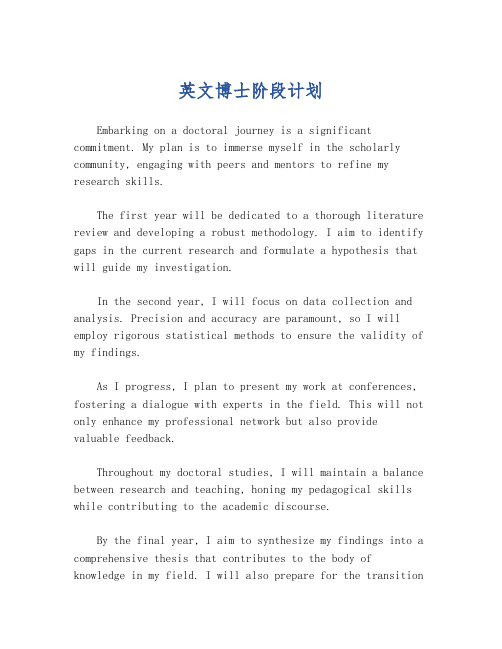
英文博士阶段计划Embarking on a doctoral journey is a significant commitment. My plan is to immerse myself in the scholarly community, engaging with peers and mentors to refine my research skills.The first year will be dedicated to a thorough literature review and developing a robust methodology. I aim to identify gaps in the current research and formulate a hypothesis that will guide my investigation.In the second year, I will focus on data collection and analysis. Precision and accuracy are paramount, so I will employ rigorous statistical methods to ensure the validity of my findings.As I progress, I plan to present my work at conferences, fostering a dialogue with experts in the field. This will not only enhance my professional network but also provide valuable feedback.Throughout my doctoral studies, I will maintain a balance between research and teaching, honing my pedagogical skills while contributing to the academic discourse.By the final year, I aim to synthesize my findings into a comprehensive thesis that contributes to the body of knowledge in my field. I will also prepare for the transitionfrom academia to the professional world, exploring career opportunities that align with my research interests.The pursuit of a PhD is not just about academic achievement; it's about personal growth. I am committed to developing resilience, critical thinking, and a lifelong passion for learning.In conclusion, my doctoral journey will be a blend of intellectual exploration, professional development, and personal growth, culminating in a meaningful contribution to my field of study.。
博士期间学习计划 英文
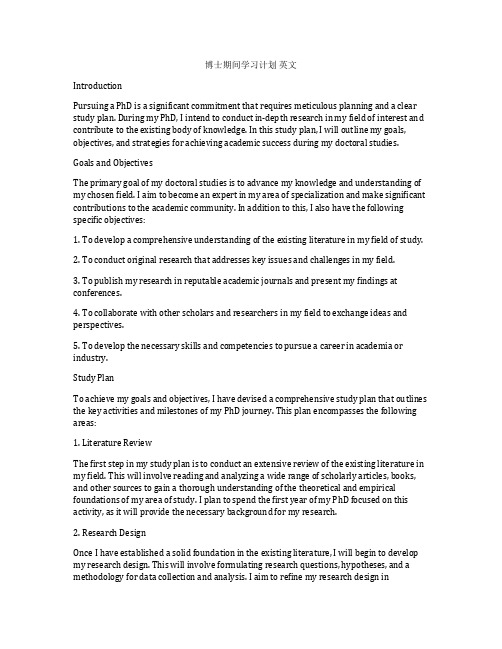
博士期间学习计划英文IntroductionPursuing a PhD is a significant commitment that requires meticulous planning and a clear study plan. During my PhD, I intend to conduct in-depth research in my field of interest and contribute to the existing body of knowledge. In this study plan, I will outline my goals, objectives, and strategies for achieving academic success during my doctoral studies.Goals and ObjectivesThe primary goal of my doctoral studies is to advance my knowledge and understanding of my chosen field. I aim to become an expert in my area of specialization and make significant contributions to the academic community. In addition to this, I also have the following specific objectives:1. To develop a comprehensive understanding of the existing literature in my field of study.2. To conduct original research that addresses key issues and challenges in my field.3. To publish my research in reputable academic journals and present my findings at conferences.4. To collaborate with other scholars and researchers in my field to exchange ideas and perspectives.5. To develop the necessary skills and competencies to pursue a career in academia or industry.Study PlanTo achieve my goals and objectives, I have devised a comprehensive study plan that outlines the key activities and milestones of my PhD journey. This plan encompasses the following areas:1. Literature ReviewThe first step in my study plan is to conduct an extensive review of the existing literature in my field. This will involve reading and analyzing a wide range of scholarly articles, books, and other sources to gain a thorough understanding of the theoretical and empirical foundations of my area of study. I plan to spend the first year of my PhD focused on this activity, as it will provide the necessary background for my research.2. Research DesignOnce I have established a solid foundation in the existing literature, I will begin to develop my research design. This will involve formulating research questions, hypotheses, and a methodology for data collection and analysis. I aim to refine my research design incollaboration with my supervisory committee and other experts in my field to ensure the rigor and validity of my study.3. Data Collection and AnalysisWith a clear research design in place, I will commence with data collection and analysis. This will involve gathering empirical evidence through interviews, surveys, experiments, or other methods, depending on the nature of my research. I will use appropriate statistical or qualitative techniques to analyze the data and draw meaningful conclusions from my findings.4. Writing and PublicationThroughout my doctoral studies, I plan to write and publish my research in reputable academic journals and present my findings at conferences and symposiums. I will also seek opportunities to collaborate with other researchers and scholars in my field to exchange ideas and perspectives and to receive feedback on my work.5. Collaboration and NetworkingIn addition to my individual research activities, I will actively seek opportunities to collaborate with other scholars and researchers in my field. This may involve joining research groups, attending seminars and workshops, or participating in academic exchanges. By fostering collaborations and networks, I hope to gain valuable insights and perspectives from others and contribute to the collective knowledge of my field.6. Skill DevelopmentFinally, I recognize the importance of developing the necessary skills and competencies to succeed in academia or industry. This may include attending workshops on research methods, writing, or teaching, as well as honing my presentation and communication skills.I will also seek opportunities to gain teaching experience, mentorship, and leadership roles to prepare for my future career.ConclusionIn conclusion, my study plan for my PhD is comprehensive and ambitious, encompassing a range of activities and milestones to achieve my goals and objectives. I am committed to conducting original and rigorous research, contributing to the existing body of knowledge, and developing the necessary skills and competencies to succeed in academia or industry. I am excited about the opportunities and challenges that lie ahead and look forward to making meaningful contributions to my field.。
英文博士阶段计划

英文博士阶段计划During my doctoral studies, my plan is to conduct in-depth research on the intersection of technology and education. I aim to investigate how the integration of technology in educational settings can enhance student learning outcomes and improve teaching practices. I plan to explore various technological tools and their impact on student engagement, motivation, and academic achievement.In addition to conducting empirical research, I also intend to critically analyze existing literature on the subject to gain a comprehensive understanding of the current state of the field. I plan to attend relevant conferences and workshops to stay updated on the latest developments in educational technology and to network with other scholars in the field.Furthermore, I plan to collaborate with educators and technology experts to design and implement innovative teaching strategies that leverage technology to create engaging and interactive learning experiences for students.I hope to contribute to the advancement of knowledge inthis area and to make a meaningful impact on educational practices.Overall, my goal during my doctoral studies is to deepen my understanding of the relationship between technology and education and to contribute to the field through original research and practical applications.在我的博士阶段,我的计划是深入研究技术和教育的交叉领域。
博士英语学习计划大学
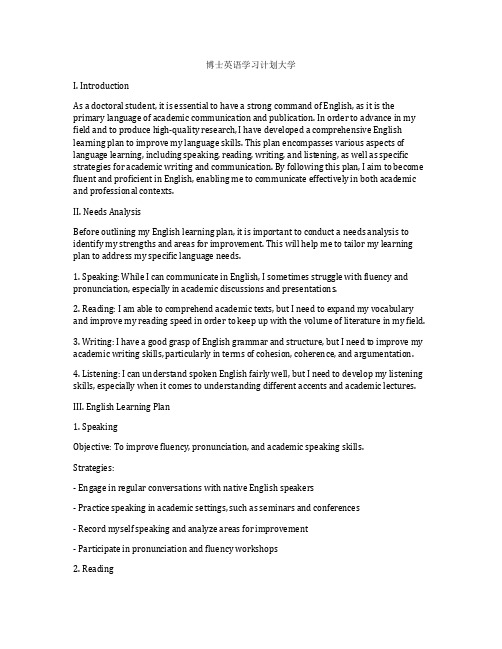
博士英语学习计划大学I. IntroductionAs a doctoral student, it is essential to have a strong command of English, as it is the primary language of academic communication and publication. In order to advance in my field and to produce high-quality research, I have developed a comprehensive English learning plan to improve my language skills. This plan encompasses various aspects of language learning, including speaking, reading, writing, and listening, as well as specific strategies for academic writing and communication. By following this plan, I aim to become fluent and proficient in English, enabling me to communicate effectively in both academic and professional contexts.II. Needs AnalysisBefore outlining my English learning plan, it is important to conduct a needs analysis to identify my strengths and areas for improvement. This will help me to tailor my learning plan to address my specific language needs.1. Speaking: While I can communicate in English, I sometimes struggle with fluency and pronunciation, especially in academic discussions and presentations.2. Reading: I am able to comprehend academic texts, but I need to expand my vocabulary and improve my reading speed in order to keep up with the volume of literature in my field.3. Writing: I have a good grasp of English grammar and structure, but I need to improve my academic writing skills, particularly in terms of cohesion, coherence, and argumentation.4. Listening: I can understand spoken English fairly well, but I need to develop my listening skills, especially when it comes to understanding different accents and academic lectures.III. English Learning Plan1. SpeakingObjective: To improve fluency, pronunciation, and academic speaking skills.Strategies:- Engage in regular conversations with native English speakers- Practice speaking in academic settings, such as seminars and conferences- Record myself speaking and analyze areas for improvement- Participate in pronunciation and fluency workshops2. ReadingObjective: To expand vocabulary and improve reading speed and comprehension. Strategies:- Read academic articles and books on a regular basis- Use vocabulary-building exercises and flashcards- Set specific reading goals to increase volume and variety of texts- Join a reading group or book club to discuss literature in English3. WritingObjective: To improve academic writing skills, including cohesion, coherence, and argumentation.Strategies:- Write regularly, including essays, research papers, and literature reviews- Seek feedback from advisors, peers, and writing tutors- Study academic writing styles and structures- Take a course in academic writing and publishing4. ListeningObjective: To improve listening skills, including comprehension and understanding of different accents.Strategies:- Listen to podcasts, lectures, and audio books in English- Practice listening to academic talks and presentations- Watch English-language films and TV shows- Engage in conversations with speakers of different English accentsIV. Academic English SkillsIn addition to the general language skills outlined above, there are specific academic English skills that I need to develop in order to excel in my doctoral studies and future career. These include:1. Academic Writing: To improve my ability to write clear, concise, and well-structured academic papers, I will dedicate time to studying academic writing styles, practicing different types of writing, and seeking feedback from mentors and peers.2. Research Writing: To become proficient in writing research proposals, abstracts, and reports, I will focus on understanding the conventions of academic research writing and practice writing proposals and reports based on my own research.3. Presentation Skills: To improve my ability to present research findings and engage in academic discussions, I will seek opportunities to present at conferences, attend workshops on effective presentation skills, and practice public speaking.4. Academic Vocabulary: To expand my academic vocabulary and use language appropriate for scholarly writing, I will engage in focused vocabulary building exercises and practice using new words in context.V. Assessment and EvaluationIn order to ensure that my English learning plan is effective and that I am making progress, I will regularly assess and evaluate my language skills and adjust my learning plan as needed. This will involve:1. Setting specific language learning goals and objectives2. Conducting regular self-assessments of language skills3. Seeking feedback from language tutors, mentors, and peers4. Tracking and reflecting on language learning progress5. Adjusting my learning plan based on assessment results and feedbackVI. ConclusionIn conclusion, the development of my English learning plan is essential for my success as a doctoral student and future academic researcher. By focusing on specific language skills, academic English skills, and continuous assessment and evaluation, I am confident that I will improve my language proficiency and communication abilities. With dedication, practice, and a clear plan in place, I am committed to achieving my language learning goals and becoming fluent and proficient in English. This will not only benefit my academic and professional career, but also facilitate my integration into the international academic community.。
Teaching Plan 教学计划
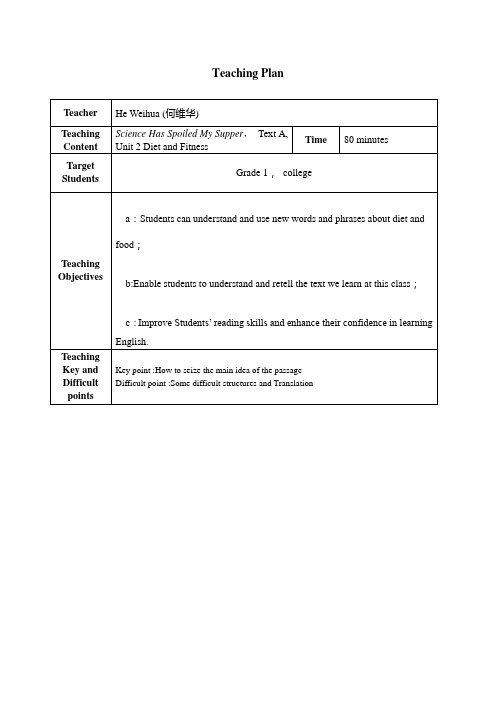
Teacher
He Weihua (何维华)
Teaching Content
Science Has Spoiled My Supper,Text A,Unit 2 Diet and Fitness
Time
80 minutes
Target Students
Grade 1,college
★ transit n.
process of going or being taken or transported from one place to another搬运,运输
e。g。These goods were damaged in transit.这些货物在运输过程中损坏了。
★keen adj。eager;enthusiastic热切的,热情的,热心的
e。g。She has a good command of five foreign languages。她熟练掌握五门外语。
★ wholesaler n.
a person whose business isbuying large quantities of goods and selling them in smaller amounts,for example to shops批发商
★in the name of以……的名义
e。g。They committed the crimes in the name of religion。他们以宗教的名义进行犯罪活动.
I arrest you in the name of the law.我依法逮捕你。
★take to sth开始沉湎于,养成……的习惯
★to my mind依我看,在我看来
Teaching Plan教案

Teaching Plan教案Teaching Plan for UdulTeaching: Unit1 What did Zhan Tianyou do?Teaching Aims:1.Let students collation about Zhan Tianyou as much aan wlp of Iand librader to get familiar wword2.Let students maw wordarticlLet students maaw to describe aw by learning the example.Teaching aids: recorderTeaching methods: Bottom-up approachTeaching Procedur es :Warming upT: Good morning, evHow do you gveryday?:by bike, by busT: Good. I’d lduce ad of traTrain ,Then on w hat kind of road does a train run?Ss:…T: Railroad.T: Do you know one famous railroad built last year? It’s Tibet-railroad.T: Do you like it?T: Wonderful! Do youdifficult or easy to build such a railroad?Ss:…2 Lead-T: It is very difficult to build such a railroad. How abouailroada? Do you know the name?Ss:…T: Its nagzhang Railroad. Who built it?Ss:…T: Zhan Tianyou.T: Do you waw more about Zhan Tianyou? Please follow me to learn Module11 Unit1 What did Zhan Tianyou do?:PraHave Ss describuacher describe it agaumma:ActivT: Now it’s the greaget close to Zhan Tianyou. Nowur book and do ActivLarefully and use the words to fill the blaT: Let’answb:Activity Two Lape ,and answer two quWhat walking about? When did Zhan Tianyou die?(Ss answer)T: More quu. Who was Zhan Tianyou? (He was a national hero. )T: What did he do? ( He was an enga famous railroad.)T: When did he w? (Fro905 to 1909.)At last ,understandversaPraT: I will give you two minuad the dialogue loudly by yourselves. Then read in grouFree TalkT: Just now we talked about a lot of Zhan Tianyou. he was a greaThen how about your hero?T: You can do lA:Wur hero?B:Liuxiang.A: Why?B: Because he can run faummaryWhat have you lealesson?Homewor。
Teaching Plan(模板)精选全文

可编辑修改精选全文完整版Teaching PlanTeaching Content:Go for it, (students’ book of grade 9)Unit 1 How do you study for a test? (Section B, 3a, 3b, 3c.)Teaching Time: One class hour (40 minutes)Teaching Aims:1. Learn and master new words, phrases and sentence patterns.2. Enable the students to talk in English about how to study English very well.3. Develop the students reading and writing ability.Important Points:1. Master some phrases and the objective clause.2. Improve the students’ reading and writing ability on English learning skills.3. Learn to co-operate in the study with classmateTeaching Difficult Points:1. Phrases and Sentence Patterns:first of all, later on, laugh at, take notesSb. realize that – clause2.Improv e the students’ reading skills---skimming and scanning, locating the specificinformation.Teaching Methods:1. Task-based language teaching method.2. Question-and-answer activities to help the students to go through the whole passage.3. Individual, pair and group work to make every student work in class.Teaching Aids:The blackboardTeaching Procedures:Step 1 Greeting(1 min)Teacher uses different greeting expression to say “hello” with the students Step 2 Revision and lead-in(3 min)The teacher review the language points by asking the following questions:1.Can you speak English?2.How long have learned English?3.Are you enjoying learning English?4.Do you have good ways to study English well?Step 3 Presentation for reading(4 min)Students are asked to discuss with partner in 2 minutes and answer the question: Would you like to learn English well?Step 4 While-reading (25min)1. Fast reading(5 min)The students are given 2 minutes to read passage quickly. And then answer a question:How does she learn English well?The right answer will be repeated and written on the blackboard.2. Careful reading(10 min)After the teacher explain the main phrases “first of all, later on, laugh at, take notes”,and sentence patterns “ Sb. realize that – clause”, the students are given 4 minutes toread passage carefully again and do the exercises in pairs 3a, 3b,.The answer will be shared by the students in the group. And one representative willshare their group’s answer with the whole class.3. Practice(10 min)1) The teacher summarizes the good ways to learn English mentioned in the text..2) Divide students to groups to discuss how to become a better language learner.Then write a complete letter with about 50 words.Step 5 Post-reading(6 min)Make a competition: Invite the leader to read the complete letter.Step 6 Homework(1min)e the vocabulary learned in the class to write a short report on your own learning experience.2.Do a research on the good or helpful lessons on English learning.The Blackboard Design:Reflection:(It will be written just after class)。
教育学博士研究计划英文面试
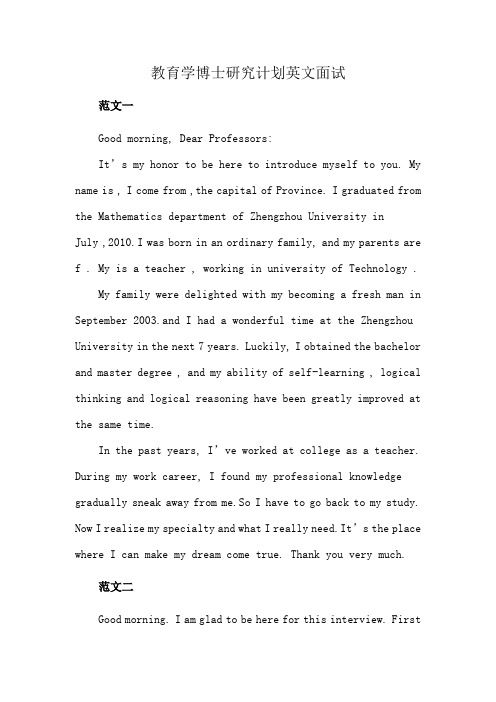
教育学博士研究计划英文面试范文一Good morning, Dear Professors:It’s my honor to be here to introduce myself to you. My name is , I come from ,the capital of Province. I graduated from the Mathematics department of Zhengzhou University inJuly ,2010.I was born in an ordinary family, and my parents are f . My is a teacher , working in university of Technology .My family were delighted with my becoming a fresh man in September 2003.and I had a wonderful time at the Zhengzhou University in the next 7 years. Luckily, I obtained the bachelor and master degree , and my ability of self-learning , logical thinking and logical reasoning have been greatly improved at the same time.In the past years, I’ve worked at college as a teacher. During my work career, I found my professional knowledge gradually sneak away from me.So I have to go back to my study. Now I realize my specialty and what I really need.It’s the place where I can make my dream come true. Thank you very much.范文二Good morning. I am glad to be here for this interview. Firstlet me introduce myself. My name is ..., 24. I come from ......,the capital of .......Province. I graduated from the ....... department of .....University in July ,2001.In the past two years I have been preparing for the postgraduate examination while I have been teaching .....in NO.....middle School and I was a head-teacher of a class in junior grade two.Now all my hard work has got a result since I have a chance to be interview by you 。
- 1、下载文档前请自行甄别文档内容的完整性,平台不提供额外的编辑、内容补充、找答案等附加服务。
- 2、"仅部分预览"的文档,不可在线预览部分如存在完整性等问题,可反馈申请退款(可完整预览的文档不适用该条件!)。
- 3、如文档侵犯您的权益,请联系客服反馈,我们会尽快为您处理(人工客服工作时间:9:00-18:30)。
Key information in the author’s introduction
Comments on the exercise (self-introduction)
Assignment 1: writing an author introduction
Students’ presentation;
Students’ presentation;
Class exercises 3
W10
Readingskills 3
Writing methods of academic articles
Comments on the assignments 2 (TS & SS)
Students’ presentation;
Preparation:Read the required chapter/materials before each class.
Contents:
Contents
Activities
W3
Introduction to the course
How to make PPT
Activity1: Writing self-introduction
W17
Review
W8
Readineatures of academic writing
Students’ presentation;
Class exercises 2
W9
Readingskills 2
Topic sentences and thesis statements
Assignment 2: writing TSs and TSs
A Handbook of Writing(《英语写作手册》编著丁往道外研社)
.au/studyskills/writing
/
Required Materials:The teacher’s handouts
Class exercises 4
W11
Exercises
W12
Abstracts, summaries and outlines
Assignment 3: writing the outline and the abstract
Students’ presentation;
Class exercises 5
Students’ presentation;
W7
Features of titles of academic articles
Group discussion: Compare and contrast the features of English titles and Chinese titles
Syllabus for Academic Writing
September, 2011
Textbooks:
Professional Communications(《专业英语写作原理与实务》编著曹晓玮中国人民大学出版社)
Academic Article Writing in English(《英语学术期刊论文写作原理》经管卷编著李桂荣南开大学出版社)
W13
Key information in introductions and conclusions
Comments on the assignments 3 (abs. & outl. 1)
Assignment 4: writing the outline and the abstract
Students’ presentation;
Class exercises 6
W14
Key information of Book reviews
Comments on the assignments 4 (abs. & outl. 2)
Assignment 5: writing a book review
Students’ presentation
Group discussion: Compare and contrast the features of author’s introduction in Chinese journals and that in English ones
W6
Exercises
Comments on students’ assignments 1 (author’s intr.)
W15
Comments on book reviews
Features of APA style and MLA style
Comments on the assignments 5
Students’ presentation
W16
Citation and plagiarism
Students’ presentation
W4
General formats of academic articles
Students’ presentation;
Group discussion: Compare and contrast the features of the layout in Chinese journals articles and that in English ones
